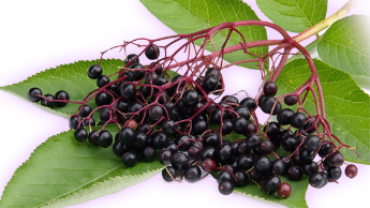
With cold and flu season in full swing and the added stress of winter doldrums the immune system could use some extra support this time of year. The use of elderberries for giving the body a boost has a tradition in folk medicine dating back to the 17th Century. In fact it is said that Hippocrates called the elder tree his “medicine chest” because of its many health-promoting properties. Modern research now supports what our ancestors seemed to have figured out long ago namely that elderberries have several properties that make them a great addition to the arsenal against winter illnesses.
Like most other berries elderberries are a good source of antioxidants. In fact their oxygen radical absorbing capacity (ORAC) score is higher than that of cranberries and blueberries both frequently touted for their high ORAC scores. Elderberries owe their dark purple-black color to the same anthocyanin and quercetin compounds found in other boldly colored berries and fruits such as blackberries red apples red onions and black plums.
Beyond its antioxidant benefits elderberry has been shown to be quite powerful in the face of various strains of influenza and bacterial infections. In a double-blind randomized controlled trial (RCT) elderberry extract was demonstrated to have immune system modulating properties in healthy people suggesting that elderberry plays a role in boosting overall immune function. Elderberry extract was shown to be effective against 10 different strains of the flu and reduced the duration of flu symptoms compared to placebo. The same study showed that elderberry extract increased production of inflammatory cytokines (IL-1 beta TNF-alpha IL-6 IL-8) by 2-45 fold compared to lipopolysaccharide (LPS) a known monocyte activator which ramped up these immune tools by just 3-10 fold. The study authors concluded that in addition to its antiviral properties elderberry extract activates healthy immune systems by increasing production of these inflammatory cytokines.
Many other studies support elderberry’s efficacy against multiple flu strains and other illnesses. In another double-blind RCT elderberry syrup (15mL 4x/day for five days) led to relief from symptoms four days earlier compared to placebo. The study involved 60 patients (ages 18-54) experiencing flu-like symptoms for 48 hours or less.
Another gold-standard study showed that subjects given elderberry extract experienced faster resolution of symptoms than with placebo when administered within 24 hours of onset of fever myalgia cough and/or nasal discharge. In the elderberry group 93% of subjects showed significant improvement in symptoms including fever in just two days compared to six days for the placebo group. Complete resolution of illness was observed in 90% of the elderberry group within just three days compared to six days in the placebo group. Of course this is only a difference of a few days but it could be significant for anyone who needs to feel their best and be ready to work at all times such as doctors emergency responders moms and dads and anyone who just wants to feel better faster. These studies suggest that elderberry could be a potent intervention when taken early on and it may be useful to take upon the first appearance of symptoms.
The flu isn’t the only illness elderberry is effective at fighting. These powerful berries pack an antimicrobial punch too. They’re effective against certain bacterial strains including gram-positive Streptococcus pyogenes group C and G Streptococci and gram-negative B. catarrhalis. Elderberry extract at a 10% concentration added to bacterial strains in liquid culture media decreased their growth by over 70% compared to untreated controls.
As if that wasn’t enough to put elderberry in the spotlight fighting winter illness isn’t the only thing elderberries have going for them. Nutritionally speaking these small berries bring pretty big returns. They’re a good source of vitamin C carotenoids vitamin B6 potassium and fiber. One cup has about 27g of carbohydrate but with 10g of fiber and a very low glycemic load they’re a good choice for people watching their carbohydrate intake but who still want to enjoy some fruit.
One word of caution: elderberries should always be eaten cooked never raw. They contain a component that may be metabolized to a cyanide-like compound in the body but cooking neutralizes this substance. Good thing considering elderberries can be used to make delicious pies and jellies.